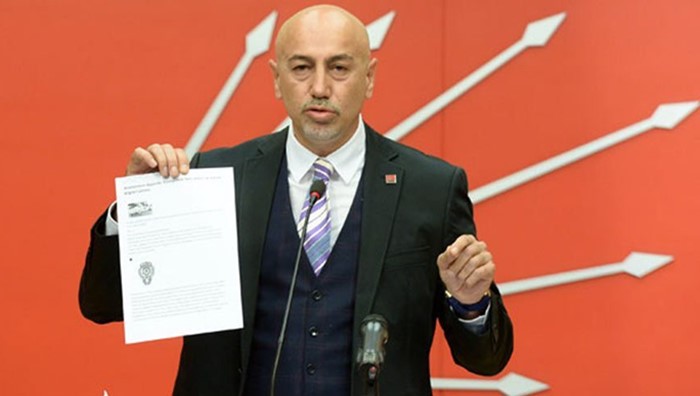Main opposition Republican People’s Party (CHP) Deputy Chairman Erdal Aksünger on Tuesday said the US will fine Turkey $10 billion over the case of Hakan Atilla, an executive of Turkey’s state-owned Halkbank accused of helping launder money for Iran, Cumhuriyet reported.
“It is said that Turkey will be fined to $10 billion. We have to pay it. If not, we can not transfer even one dollar,” Aksünger told the press in İzmir.
According to Aksünger, who has been following Atilla’s trial in a New York court, the Turkish banker faces five years in prison if found guilty.
Jurors considering the fate of Atilla last month ended three days of deliberations without a verdict and will return to court on Jan. 3 to evaluate the case further.
Aksünger also said UN sanctions against Turkey might be possible if the US turns the case into a lawsuit.
Turkish-Iranian gold trader Reza Zarrab and eight other people, including Turkey’s former economy minister and three Halkbank executives, were charged with engaging in transactions worth hundreds of millions of dollars for Iran’s government and Iranian entities from 2010 to 2015 in a scheme to evade US sanctions.
President Recep Tayyip Erdoğan on Dec. 5, 2017 said the Zarrab-Atilla case was an international coup attempt against Turkey.
Zarrab was the prime suspect in a major corruption investigation in Turkey that became public in December 2013 and implicated the inner circle of the ruling AKP government and then-Prime Minister Erdoğan. Zarrab was alleged to have paid Cabinet-level officials and bank officers bribes to facilitate transactions benefiting Iran.
After Erdoğan cast the case as a coup attempt to overthrow his government orchestrated by his political enemies, several prosecutors were removed from the case, police were reassigned and the investigation against Zarrab was dropped in Turkey.
Zarrab testified in New York federal court in early December that he had bribed Turkey’s former economy minister, Mehmet Zafer Çağlayan, in a billion-dollar scheme to smuggle gold for oil in violation of US sanctions on Iran.
Zarrab said that Turkey’s then-prime minister and current president, Erdoğan, personally authorized the involvement of Turkish banks in the scheme.
Zarrab also said Turkey’s Ziraat Bank and VakıfBank were involved in the scheme and that former Deputy Prime Minister Ali Babacan signed off with Erdoğan on the operation.
The Turkish-Iranian gold trader said he made payments to secure his release in February 2014 and that those payments were partly bribes.
The Turkish government seized the assets of Zarrab and his relatives following his testimony in the US court.
Hüseyin Korkmaz, a former İstanbul police officer who testified at the New York trial of Atilla, called Erdoğan the “No. 1” target in a group that also included Çağlayan, and Süleyman Aslan, a former chief executive at Halkbank, a large Turkish state-owned bank that was central to the sanction-busting scheme.
Police notes of the Dec. 17 operations show that Zarrab personally talked with Erdoğan on April 13, 2013 and asked for an official police guard. Erdoğan and his Cabinet approved it immediately.
A phone call and a video in the Dec. 17 file show that Zarrab in July 2013 sent an unspecified amount of money to the Service for Youth and Education Foundation of Turkey (TÜRGEV), run by Bilal Erdoğan, Erdoğan’s son.
Turkey issued detention warrants for six family members of Korkmaz following his testimony.


